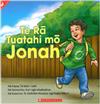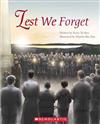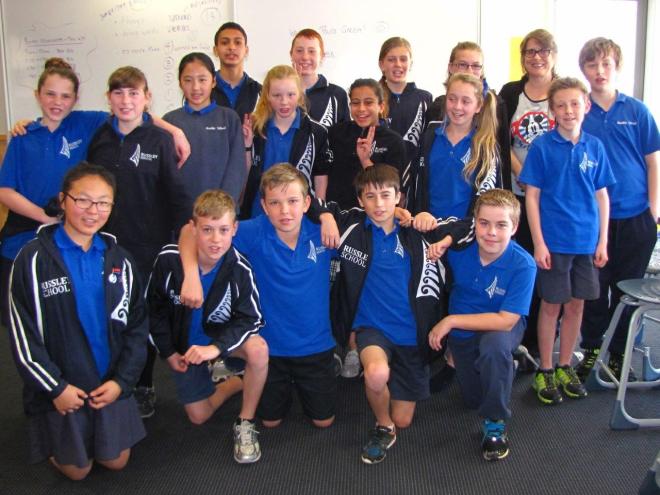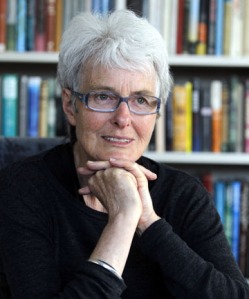Annie Robinson
My name is Annie Robinson, I am 11 years old and I live in Tauranga with my mum, dad, older brother and younger sister, our 2 guinea pigs and our cat Purdy. My hobbies include playing guitar, singing, video games, loom bands and writing!
Paula with Nonu on a very windy day at Bethell’s.
Paula Green
Paula Green lives on Auckland’s West Coast with her partner, artist Michael Hight, their two daughters, three cats and two Springer Spaniels. She has published nine poetry collections including several for children. Her first children’s book, Flamingo Bendalingo: Poems from the Zoo, was published in 2006 and was listed as a 2007 Storylines Notable Non-Fiction Book. Paula was awarded the University of Auckland Literary Fellowship in 2005. She was the 2008 judge of the New Zealand Post Secondary School Poetry Competition. NZ Listener writer Gerry Webb has written about Paula and has described her style of writing as ‘musical, sensuous, tender, quick-witted’. Paula writes for both adults and children and her most recent book of poems is The Letterbox Cat (Scholastic). She edited A Treasury of NZ Poems for Children that came out in October (Random House). Paula also hosts a blog site call Poetry Box (this blog!) which has lots of competitions, examples of great children’s poetry as well as tips and tricks on how to become a better writer.
The Interview:
What inspired you to start the poetry box blog?
I love working with children and writing for children so it seemed like a fun and challenging thing to do. I get to visit schools a lot in Auckland and sometimes in other main centres but I hardly ever get to visit schools off the beaten track. The internet can easily travel off the beaten track. I called it Poetry Box because it is full of surprises for me. I never know what I am going to pull out next. What else can Poetry Box do? How can it connect with NZ children?
Do you play any musical instruments?
I learnt to play the recorder, piano, the guitar, the clarinet and the saxophone. I was never very good at any of them, but I loved playing them all. I think I wanted to be Joni Mitchell at one stage with my long hair and acoustic guitar. I grew up in a house with lots of music (especially classical and jazz) so music is important to me. As soon as I was old enough, I loved going to concerts and music festivals. Last year I went to WOMAD which was very cool. I am really drawn to poems that sound good and when write a poem I often think it is like making a little piece of music. I love listening to music when I cook dinner, but when I am writing I mostly like the sound of the wind in the trees.
What is you’re most memorable experience?
That is a good question and a hard question because I have had lots of memorable experiences.
Being a mother … having two wonderful daughters that are such good company.
Walking the Abel Tasman Track and riding the Central Otago Rail Trail with my family.
Spending ten days in New York with my family.
Meeting Margaret Mahy and discovering my secret mentor was also a remarkable woman in how she paid attention to others and was so humble and generous.
Going skiing at The Remarkables.
Boogie boarding at Sandy Bay on the Tutukaka Coast.
Reading Dante’s poem The Divine Comedy in Italian (it is unbelievably long!).
What are some of your main inspirations for writing poetry?
The way the world catches me by surprise. Like when a cat instead of the teacher walks into the classroom. Or you turn a corner and there is the sun glinting on the ocean and you can hardly see.
Things people say.
Things.
The way real things fly the blue kite of imagination and the yellow balloon of feeling.
Words.
The way words are like little musical notes.
What is your favourite piece of writing? ( by yourself and by others)
‘Hotel Emergencies’ by Bill Manhire You can hear him read it here. Astonishing. No other word for it.
Wonder by AJ Palacio A novel that brings you back to everything that matters about being human.
Hill & Hole by Kyle Mewburn A picture-book that is so simple and so beautifully written it is poetry.
Poems by Shel Silverstein, Margaret Mahy and Elena de Roo.
The ACB with Honora Lee by Kate De Goldi Wise, tender, funny, poetic, beautifully written story
My writing? Aunt Concertina and Her Niece Evalina is very special to me because it is a small part of the bedtime story I told my girls when they were little. I was too tired to write it down so I didn’t do that until they were older. Michael did the illustrations (very beautiful oil paintings that took him ages!). So it is a family book. And the book doesn’t fit a book formula. The language is as rich as the paintings. I don’t think anyone would publish it nowadays. So I am so grateful to Jenny Hellen and Random House for that. I am rather poroiud of my teo new poetry books too. I love what Scholastic did with The Letterbox Cat and what Random House did with A Treasury of NZ Poems for Children. Thank you!!!!!!!!
What do you love most about writing?
It makes me feel good. As simple as that. I just love doing it. It is a way of making music. It is a way of doing anything. Taking risks. Being someone else. Being yourself. Exploring the world. Time travelling. Showing heart. Raising questions. Standing up for what you believe in. Questioning what you believe in. Listening to what others have written. Sharing.
































